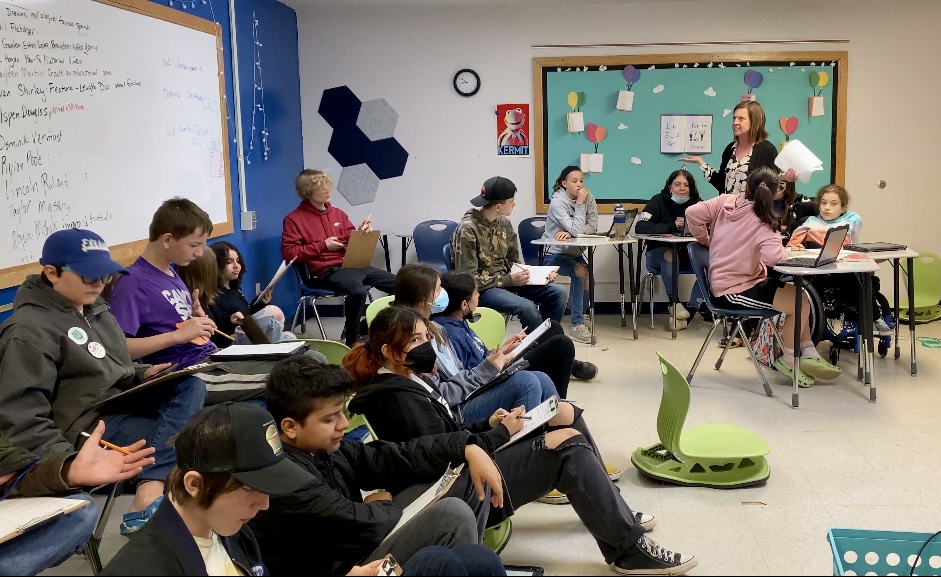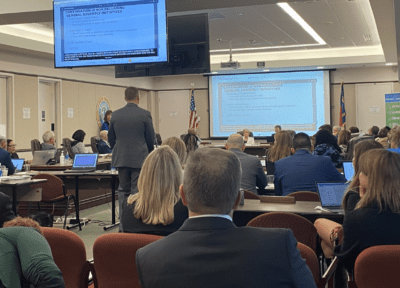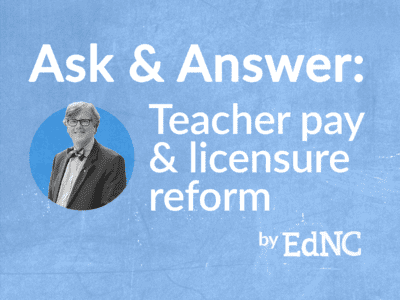
Share this story
|
|
The Professional Educator Preparation and Standards Commission (PEPSC) approved recommendations on how to pilot proposed teacher licensure and pay reform on Thursday.
These recommendations now go to the State Board of Education for the next step of what PEPSC Chair Van Dempsey called an “ongoing process.”
PEPSC approved its final draft framework at the end of 2022, and the process is now largely in the hands of the Board. At its December 2022 meeting, the Board asked PEPSC to develop recommendations on how to field test the licensure reform.
The result of that request is what PEPSC approved this week.
The proposed plan would overhaul how teachers are licensed and paid in North Carolina by introducing various levels of licensure and corresponding pay, from apprenticeship to advanced teacher roles. Pilots of this proposal could come as soon as the next school year.
To come up with recommendations to inform the pilots, PEPSC used four working groups:
- Measures of Teaching Effectiveness (formerly Student Impact Measures)
- New Pathway Entry Points
- New Professional Learning Tools and Structures
- Advanced Teaching and Leader Roles
The groups worked under a more compressed timeline than they originally planned. Each group was provided with a framework based on the initial work of PEPSC to help guide their discussions.
You can see the final recommendations from the working groups below. Each group made changes to the initial framework and added additional context, questions, or concerns to the addendums.
Chris Blanton, co-chair of the Measures of Teaching Effectiveness group, said the group believes the real work will be aligning these measures with INTASC standards, which essentially outline skills that teachers should be able to demonstrate. The group also added language that any measures used in the proposal need to be valid and reliable before they are used for compensation.
New Professional Learning Tools and Structures co-chair Hank Weddington said his group wants data on how much time district and school leaders need to implement the changes in this proposal.
One of the major proposals in this reform is the addition of advanced leadership roles and licensure. Bill Griffin, Advanced Teaching and Leader Roles co-chair, said his group thought there needed to be additional position allotments for this aspect to be implemented successfully, especially for smaller districts.
PEPSC unanimously approved these recommendations, but Watauga County Schools Superintendent Scott Elliott said his vote was conditional.
“I don’t yet think that we have the details necessary for successful implementation of a pilot, but I understand that this is an important step in moving forward to it,” he said, “and I’m grateful for the opportunity for us to pilot. And I do hope the State Board and legislature will continue to engage with PEPSC on the development of the pilot.”
Many statutory and Board policies may need to change before they can even get into the weeds about implementation, added Aaron Fleming, superintendent of Harnett County Schools and PEPSC vice chair.
It is unclear where the pilots will be. Elliott said some districts will need to see more details about implementation before volunteering to participate in a pilot.
Another unknown is funding.
“This can’t happen if it’s not funded,” state Superintendent Catherine Truitt said.
The reform proposes raising teacher starting pay higher than what is currently in statute, which would require an appropriation in the state budget that will be developed this year.
These recommendations will go to the State Board of Education for approval at its next meeting March 1-2.
Recommended reading




